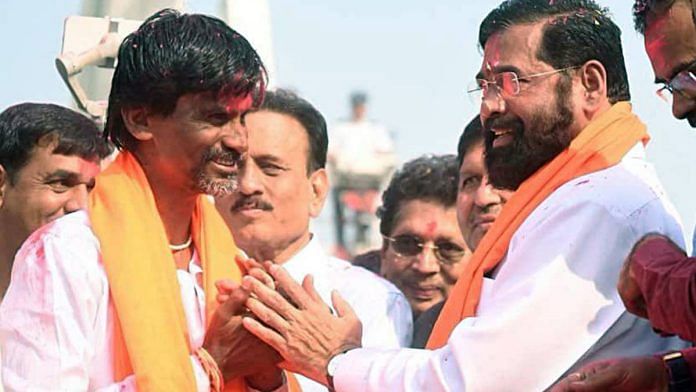Mumbai: The Eknath Shinde-led Maharashtra government’s decision to include the term “sage soyare” in its draft notification for granting Kunbi certificates to eligible persons from the Maratha community was the turning point in activist Manoj Jarange Patil’s agitation for a Maratha quota.
The state government Friday issued the draft notification to extend quota benefits associated with the Kunbi caste — which is part of the Other Backward Classes (OBC) community — to the “sage soyare” of eligible Marathas, prompting Jarange Patil to call off his protest Saturday and declare a victory for the Maratha community.
The Marathi term “sage soyare” means through birth relations and through relations by marriage, and will basically mean that a significant part of the Maratha community now stands to gain quota benefits as Kunbis. There is, however, a caveat. The marriages have to be within the same caste, an official from the Maharashtra Chief Minister’s Office (CMO) told ThePrint.
Many Maratha leaders and historians claim that the origin of Marathas is in the agrarian Kunbi clan, which has been getting reservation under the OBC category. The Supreme Court had struck down a standalone quota for Marathas in government jobs and education in 2021, calling it “unconstitutional”.
The state government filed a review petition and later a curative petition, which is still pending in the apex court. Jarange Patil had demanded that while the case for a standalone quota is still in court, the government should grant Marathas the status of Kunbis.
“The CM always intended for the Kunbi caste benefits to be for ‘sage soyare’, but we hadn’t formally implemented that provision because we were still getting it legally vetted. We don’t want to be in a situation where it doesn’t stand the test of law and makes the community feel we have hoodwinked it,” the above-mentioned CMO official said.
Also Read: Six friends & an amorphous group of Marathas — the backbone of Manoj Jarange-Patil’s quota stir
Kunbis and ‘sage soyare’
Jarange Patil, who hails from Marathwada’s Jalna district, has led three agitations for a Maratha quota so far.
The state government had in September last year formed a committee under retired judge Sandeep Shinde to find Kunbi records among Marathas. After Jarange Patil’s second agitation that ended in November, CM Shinde asked all district collectorates to ramp up the work of finding Kunbi records and granting Kunbi caste certificates to eligible Marathas.
According to state government officials, so far about 57 lakh Kunbi records have been found among Marathas and the “sage soyare” clause can take the number even up to 2 crore. Marathas comprise about 32 per cent of Maharashtra’s population of 11.23 crore.
The official from the CMO explained that “sage” means everyone in the direct lineage of Marathas with Kunbi records will be eligible for a Kunbi caste certificate.
“So, if someone’s great grandfather’s name has been recorded only as the first name and not the last name, and that person has got a Kunbi caste certificate, then by verifying the lineage, the other descendants of that great grandfather can also be considered eligible for Kunbi certificates,” he said, adding that paternal lineage will be taken into consideration “since we follow a patriarchal system”.
“Soyare” refers to relations through marriage. If a family forged relations with another family through marriage even two or three generations ago, and a member of one family gets a Kunbi caste certificate, then members of the other family can also claim to be Kunbis and get the caste benefits. This clause is, however, slightly nuanced. The base condition is that the marriage has to be within the same caste. Inter-caste or inter-religious marriages will not be considered eligible.
“In Maharashtra, especially in rural areas, people still marry within their caste. If there is a claim for a Kunbi certificate through relations via marriage, it will be vetted first by talathi-level officers (of revenue department at the taluka-level) and the police to ensure that the marriage was within the caste. Any inter-caste or inter-religion marriage will not be considered,” the official quoted above said.
The state government has issued a draft notification to apply Kunbi benefits among eligible Marathas to the “sage soyare” and has invited suggestions and objections on it till 16 February.
The move has angered the OBC community, which believes it will shrink space for the OBC population within its quota.
OBC leader Chhagan Bhujbal, who is a minister from the Ajit Pawar-led Nationalist Congress Party in the Shinde government, has asked all OBC lawyers, intellectuals and grassroots karyakartas to “send objections in lakhs so that the government knows the other side”.
(Edited by Nida Fatima Siddiqui)
Also Read: JCB showering flowers, packed rallies — how Jarange-Patil is building ‘mass leader’ image



